 Technology peripherals
Technology peripherals
 AI
AI
 NVIDIA technology assists the CAC2023 League and promotes AI-led technological innovation!
NVIDIA technology assists the CAC2023 League and promotes AI-led technological innovation!
NVIDIA technology assists the CAC2023 League and promotes AI-led technological innovation!
NVIDIA has released DLSS 3.5 since September 21, 2023. This is a new AI-driven technology that uses ray reconstruction technology to further improve ray tracing quality and make game images more realistic. If DLSS 3 allows players to play more smoothly, DLSS 3.5 focuses more on experience. It just so happens that the CAC 2023 League is being held in Shanghai, and NV is also one of the sponsors. Let's talk about the two major technologies of DLSS 3.5 and reflex.
Development of DLSS
Throughout the development of DLSS, two words "AI" are indispensable. Putting aside DLSS 1, we start directly with the super-resolution technology of DLSS 2. Through AI, we directly achieve four times supersampling of the real-time rendering results of the game. That is to say, if you want to get 4K, the game engine only needs to render 1080P pictures, thus getting Higher frame rates. Use AI to fill in the missing information after reducing the rendering resolution and generate high-quality images with ultra-high performance.
This is possible because the GeForce RTX GPU has an AI processor called Tensor Core, which is a brand new deep learning neural network that can help quickly execute AI models, increase frame rates, and generate Better game graphics. It was unthinkable in the past to be able to run an AI model on every frame of a high-resolution video, but now it is. The original DLSS requires training an AI network for each new game, while DLSS 2 can provide a common network used across games, which means game inheritance is faster.
Although DLSS 3 did not cause a huge sensation at the time, due to the addition of AI, it also paved the way for subsequent success
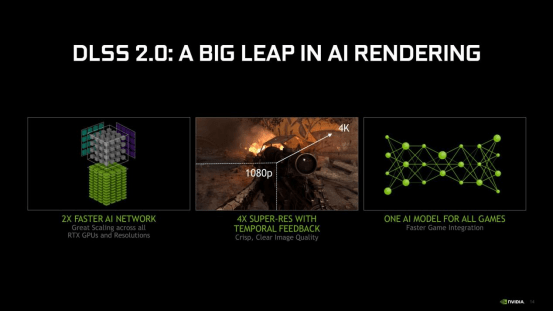
DLSS 3 adds frame generation technology based on super-resolution and DLAA: using AI technology to generate more frames to further improve performance. When we turn on DLSS3 in the game, the game rendering resolution is reduced and the computing pressure is reduced. AI will intelligently calculate and construct a high-resolution picture based on the current image and the previously rendered image. . DLSS 3 technology also includes Reflex technology, which can dynamically optimize image rendering instructions and queues, thereby reducing the pressure on the CPU when rendering the queue and effectively reducing the response delay of the game. We will also mention the Reflex technology in detail later.
Each frame is determined by the DLSS frame generation AI network, which determines how to generate intermediate frames using the game's motion vectors, optical flow fields, and information from subsequent frames. By using the game's motion vectors and optical flow to track motion, the DLSS frame generation AI network is able to accurately reconstruct geometry and effects. Of course, in order to keep the average frame rate stable, the interval between each inserted frame needs to be as consistent as possible, otherwise the picture may feel stuck
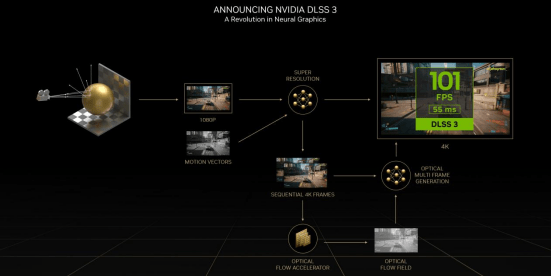
The latest DLSS 3.5 solves the problem of game fluency under DLSS3 and focuses on the experience of light chasing games. DLSS 3.5 introduces ray reconstruction technology, an AI model that can further improve ray tracing images for intensive ray tracing games and applications. Ray reconstruction is achieved by replacing the previous hand-designed graphics denoiser with an AI network trained on NVIDIA's teardown calculator
In the past, the algorithm used by the artificial noise reducer would cause the problem of light speed slowing down under lighting conditions, and it could not fully reflect the reflection effect of all light in the environment. However, ray reconstruction techniques are trained using offline rendered images, which requires more computing power than required for real-time gaming. Light reconstruction can identify lighting patterns from training data, such as global illumination or ambient occlusion lighting patterns, and the final effect is better than denoisers that require manual design. The amount of training data for DLSS 3.5 is also five times that of DLSS 3
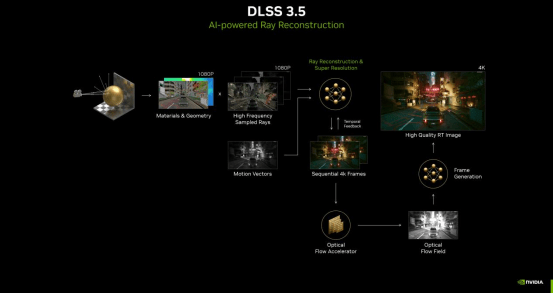
DLSS 3.5 has performed exceptionally well in "Cyberpunk 2077: Shadows of the Past" and "Alan Killer 2", which was released just last month. For example, the Night City is full of reflections of billboards and neon lights. Judging from the reflection on the water, the water surface of DLSS OFF is blurred, and only the rough outline color can be seen clearly. When DLSS 3.5 is turned on, the text on the billboard is clear.
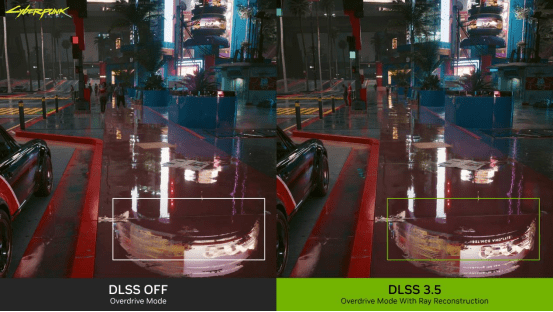
NVIDIA Reflex
NVIDIA Reflex technology is commonly used in FPS games. During the halftime break of the CAC2023 league, we could even see NV promoting this technology on the big screen. This technology mainly synchronizes the GPU and CPU, optimizing response speed and reducing system latency by deleting the rendering queue between CPU and GPU. It contains two technologies: one is the Reflex low-latency mode, which is used to shorten the system latency in the game to help players improve their competitive performance; the other is the Reflex analyzer, which is used to easily and quickly measure system latency.
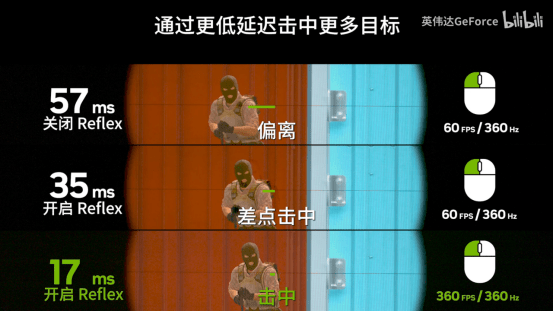
Players with GPUs that support Reflex technology can enable NVIDIA Reflex in CS, which can reduce system latency by up to 35%. Currently, more than 50 million players use NVIDIA Reflex every month. Among the 10 major competitive shooting games, 9 games already support NVIDIA Reflex. Among more than 80 games that support NVIDIA Reflex, 90% of GeForce players have NVIDIA Reflex
activated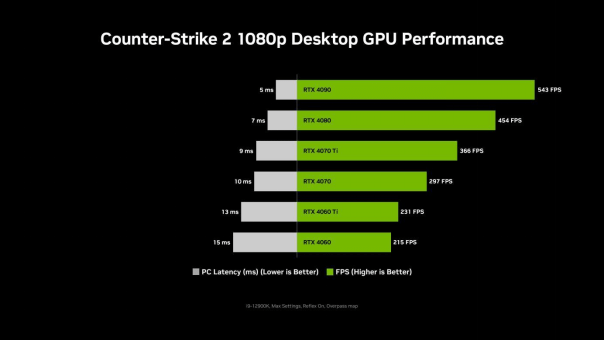
At the competition site, we particularly noticed that professional players enabled NVIDIA Reflex low-latency technology in CS game settings
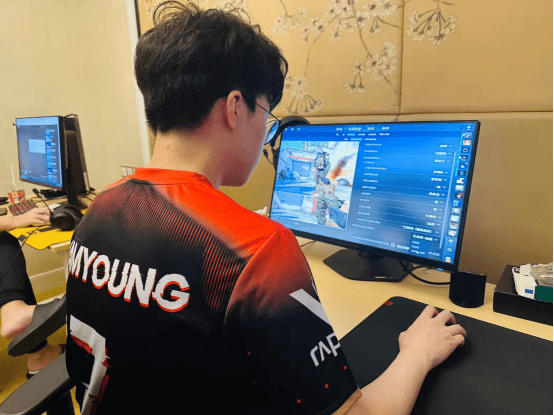
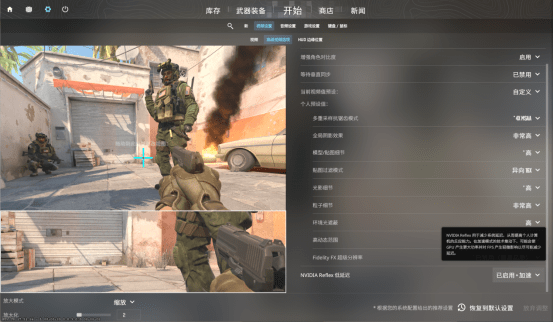
CAC2023 League
This time I am also very fortunate to be able to watch the CAC semifinals and finals live at Shanghai Yuanshen Sports Center. The first match was between Team A and MOUZ. MOUZ defeated Team A 2:1 to advance to the finals.
Picture 1: Overpass performed well in MOUZ’s personal abilities and won with a score of 13 to 10
Picture 2: Mirage device and Staehr played well to regain 10% at 13:3
Picture 3: Vertigo MOUZ had a huge advantage of 12:0 in the first half and finally advanced to the final with a score of 13:7
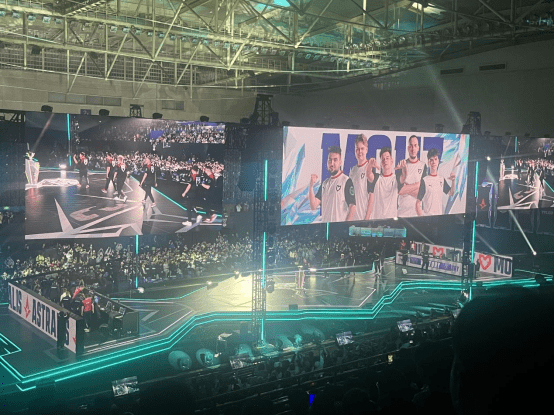
The second semi-final is the much-anticipated FaZe versus ENCE
The rewritten content is as follows: Picture 1: NuKe ENCE was in hot form and defeated FaZe 13:8
Rewritten content: Picture 2: The ancient FaZe successfully brought the game into overtime at 16:14 and reversed to win
Picture 3: Anubis FaZe still chased all the way and successfully advanced at 13:11
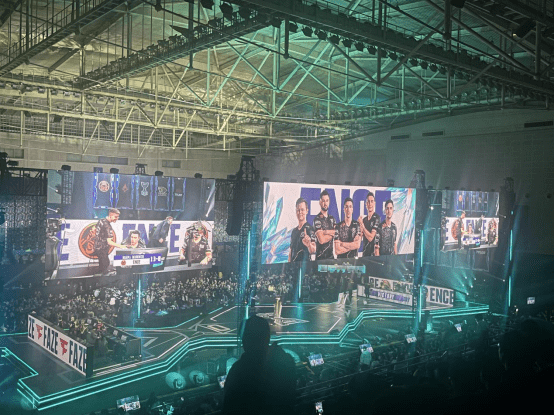
In the final MOUZ once again faced off against FaZe, who has had many encounters recently
Picture 1: Mirage FaZe13: 7 easily defeated the opponent
Picture 2: The two sides of Nuke were inseparable until the third overtime with a wave of 4:0 and finally won the championship at 22:18
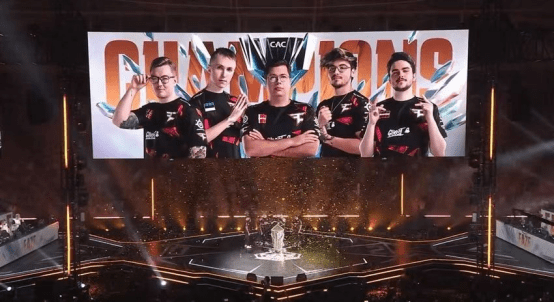
Although the CAC finals have ended, another major event has been officially announced: Valve’s official highest-level CS event-the 2024 Winter Major will be held in Shanghai, China! The world's top CS teams will gather in Shanghai to compete for the highest honor of CS. This is the first time that the highest-level official event has been held in Asia since the birth of CS in 1999. It is also the first time that a Major has been held in Asia since the first Major in 2013. Choose 40 series to play CS and enjoy the professional e-sports experience provided by NVIDIA Reflex

The above is the detailed content of NVIDIA technology assists the CAC2023 League and promotes AI-led technological innovation!. For more information, please follow other related articles on the PHP Chinese website!

Hot AI Tools

Undresser.AI Undress
AI-powered app for creating realistic nude photos

AI Clothes Remover
Online AI tool for removing clothes from photos.

Undress AI Tool
Undress images for free

Clothoff.io
AI clothes remover

Video Face Swap
Swap faces in any video effortlessly with our completely free AI face swap tool!

Hot Article

Hot Tools

Notepad++7.3.1
Easy-to-use and free code editor

SublimeText3 Chinese version
Chinese version, very easy to use

Zend Studio 13.0.1
Powerful PHP integrated development environment

Dreamweaver CS6
Visual web development tools

SublimeText3 Mac version
God-level code editing software (SublimeText3)

Hot Topics
 1386
1386
 52
52
 git software installation
Apr 17, 2025 am 11:57 AM
git software installation
Apr 17, 2025 am 11:57 AM
Installing Git software includes the following steps: Download the installation package and run the installation package to verify the installation configuration Git installation Git Bash (Windows only)
 How to solve the complexity of WordPress installation and update using Composer
Apr 17, 2025 pm 10:54 PM
How to solve the complexity of WordPress installation and update using Composer
Apr 17, 2025 pm 10:54 PM
When managing WordPress websites, you often encounter complex operations such as installation, update, and multi-site conversion. These operations are not only time-consuming, but also prone to errors, causing the website to be paralyzed. Combining the WP-CLI core command with Composer can greatly simplify these tasks, improve efficiency and reliability. This article will introduce how to use Composer to solve these problems and improve the convenience of WordPress management.
 How to solve SQL parsing problem? Use greenlion/php-sql-parser!
Apr 17, 2025 pm 09:15 PM
How to solve SQL parsing problem? Use greenlion/php-sql-parser!
Apr 17, 2025 pm 09:15 PM
When developing a project that requires parsing SQL statements, I encountered a tricky problem: how to efficiently parse MySQL's SQL statements and extract the key information. After trying many methods, I found that the greenlion/php-sql-parser library can perfectly solve my needs.
 How to solve complex BelongsToThrough relationship problem in Laravel? Use Composer!
Apr 17, 2025 pm 09:54 PM
How to solve complex BelongsToThrough relationship problem in Laravel? Use Composer!
Apr 17, 2025 pm 09:54 PM
In Laravel development, dealing with complex model relationships has always been a challenge, especially when it comes to multi-level BelongsToThrough relationships. Recently, I encountered this problem in a project dealing with a multi-level model relationship, where traditional HasManyThrough relationships fail to meet the needs, resulting in data queries becoming complex and inefficient. After some exploration, I found the library staudenmeir/belongs-to-through, which easily installed and solved my troubles through Composer.
 How to solve the complex problem of PHP geodata processing? Use Composer and GeoPHP!
Apr 17, 2025 pm 08:30 PM
How to solve the complex problem of PHP geodata processing? Use Composer and GeoPHP!
Apr 17, 2025 pm 08:30 PM
When developing a Geographic Information System (GIS), I encountered a difficult problem: how to efficiently handle various geographic data formats such as WKT, WKB, GeoJSON, etc. in PHP. I've tried multiple methods, but none of them can effectively solve the conversion and operational issues between these formats. Finally, I found the GeoPHP library, which easily integrates through Composer, and it completely solved my troubles.
 Solve CSS prefix problem using Composer: Practice of padaliyajay/php-autoprefixer library
Apr 17, 2025 pm 11:27 PM
Solve CSS prefix problem using Composer: Practice of padaliyajay/php-autoprefixer library
Apr 17, 2025 pm 11:27 PM
I'm having a tricky problem when developing a front-end project: I need to manually add a browser prefix to the CSS properties to ensure compatibility. This is not only time consuming, but also error-prone. After some exploration, I discovered the padaliyajay/php-autoprefixer library, which easily solved my troubles with Composer.
 git software installation tutorial
Apr 17, 2025 pm 12:06 PM
git software installation tutorial
Apr 17, 2025 pm 12:06 PM
Git Software Installation Guide: Visit the official Git website to download the installer for Windows, MacOS, or Linux. Run the installer and follow the prompts. Configure Git: Set username, email, and select a text editor. For Windows users, configure the Git Bash environment.
 The latest tutorial on how to read the key of git software
Apr 17, 2025 pm 12:12 PM
The latest tutorial on how to read the key of git software
Apr 17, 2025 pm 12:12 PM
This article will explain in detail how to view keys in Git software. It is crucial to master this because Git keys are secure credentials for authentication and secure transfer of code. The article will guide readers step by step how to display and manage their Git keys, including SSH and GPG keys, using different commands and options. By following the steps in this guide, users can easily ensure their Git repository is secure and collaboratively smoothly with others.



